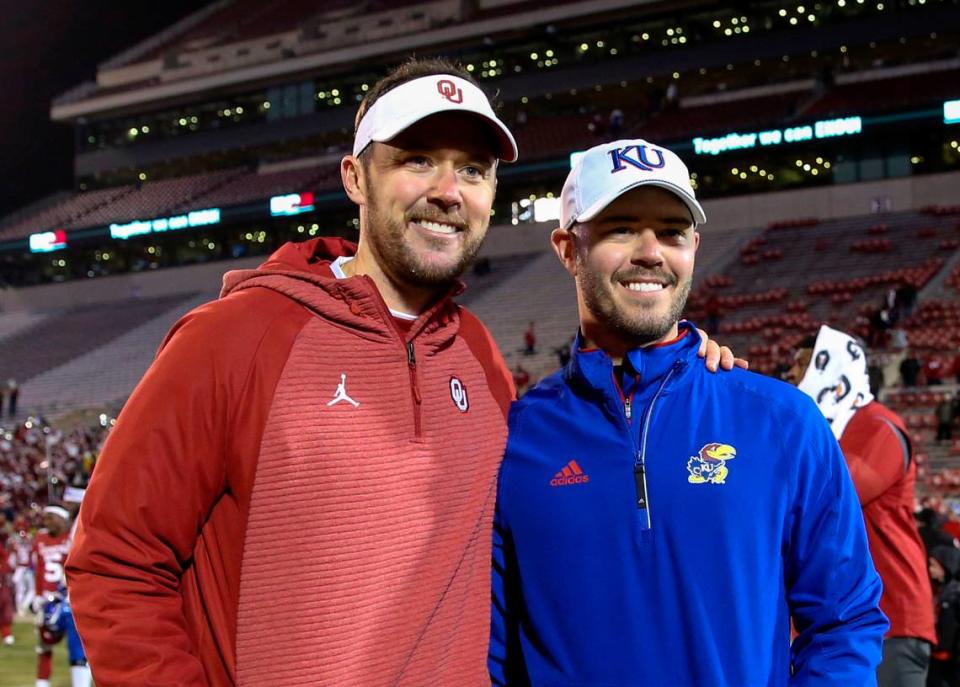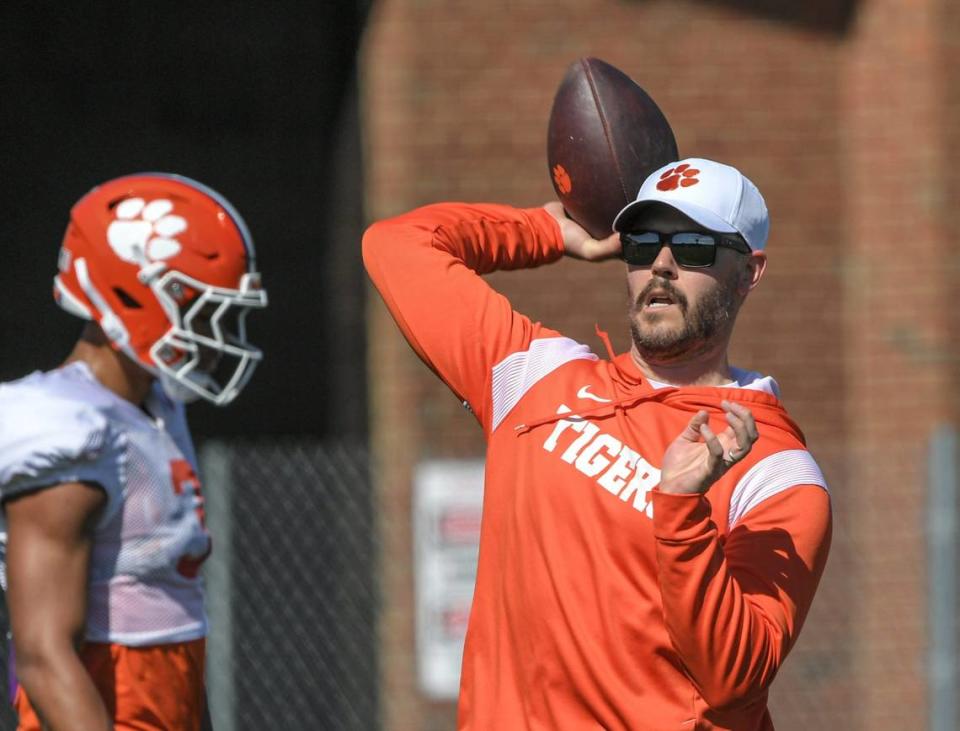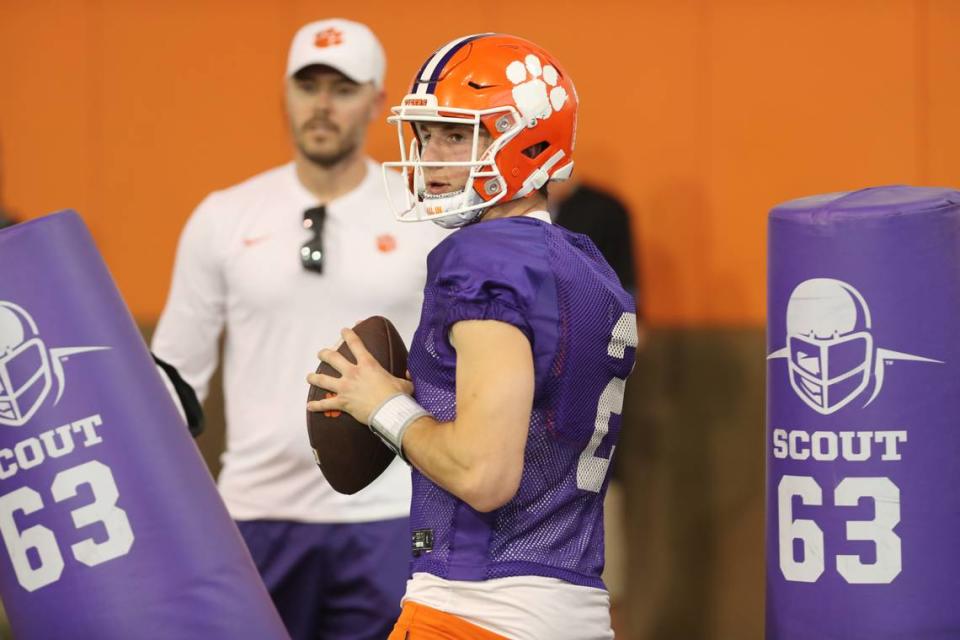Inside Garrett Riley’s rise from D3 coach to Clemson football ‘quarterback whisperer’
- Oops!Something went wrong.Please try again later.
- Oops!Something went wrong.Please try again later.
- Oops!Something went wrong.Please try again later.
- Oops!Something went wrong.Please try again later.
A decade ago, long before the Broyles Awards and the national championship appearances and the million-dollar contracts, Garrett Riley was sitting in the meeting room of a Division III school in northwest Illinois making golf club analogies.
“Welchy, this one’s like a seven iron, you know? You can get a little air under it, but you still want to hit it with some distance.”
“Hey, this is that four iron. You’ve gotta give this one everything you’ve got. Put a little more sauce on it.”
And on it went. When former Augustana College quarterback Nick Welch closes his eyes, he can still hear those football-to-golf comparisons, delivered in a young Riley’s signature and subtle Texas drawl.
Riley, Clemson’s first-year offensive coordinator and quarterbacks coach, never called plays at Augustana. As a 23-year-old running backs coach in 2012, he didn’t even lead quarterback meetings at the D3 school. But in his short time there, he made quite the impact. Golf was their “common language,” Welch said, and by talking about specific types of passes like drives and putts, Riley helped him visualize exactly what the Vikings coaching staff wanted.
“You’d go out the next day of practice, you’d rep that route, you’d put on film (after) and more times than not it was what we were looking for,” Welch said, laughing. “I’d be like, ‘Hey, that’s what we were talking about!’ ’’
Their partnership was brief yet formative. It also gave Welch a funny designation: He is, technically speaking, the first college quarterback to benefit from Riley’s coaching.
But he’s far from the last.
Since his single season at Augustana, Riley has quickly emerged as one of college football’s top young offensive minds. He was a position coach at 26. An offensive coordinator at 31. The winner of the Broyles Award, given to the nation’s top assistant, at 33.
Now, he arrives at Clemson with a reputation at each of his previous jobs as a “quarterback whisperer” — someone with the right combination of scheme and savvy to fully unlock the potential of sophomore Cade Klubnik and guide the Tigers’ offense back to an elite national level.
But what does that actually mean? Quarterback whisperer. The State spoke with former players and coaches from throughout Riley’s career to figure out as much.
Best of luck to TCU's Garrett Riley in tonight's championship game! Riley began his coaching career with Augie in 2012 as the team's RB coach.
His journey is shared in a recent article from @TheAthletic, which references Augustana
https://t.co/iAIfzXy3Qb
(@TCU_Athletics) pic.twitter.com/crAJa56uiy— Augustana Vikings (@augieathletics) January 9, 2023
Riley’s D3 roots
For Welch, who’s now the head coach at United Township High School in East Moline, Illinois, Riley stood out because of his analogies. And his advocacy.
Augustana’s triple-option offense placed a lot of responsibility on the starting quarterback. The Vikings ran the ball on about 70% of their snaps in 2012, which made Welch responsible for dozens of split-second decisions per game. Hand the ball off or keep it? Pitch it or pull it?
He was Square One for every run, and one incorrect read could mean the difference between 5 yards and 50. Naturally, whenever he made a mistake, it was very evident in Augustana’s weekly film sessions, which the quarterbacks and the running backs watched together.
But Riley was always in his corner.
“Sometimes the read’s a little bit more gray,” Welch said. “I thought Coach Riley always did a really good job of advocating on behalf of the quarterback. (He’d say), ‘Yeah, when we pause it in this moment, it looks like we should have made a different decision. But …’ ”
And when a film session didn’t go well? When Welch had whiffed on a few reads, and there was no explaining himself out of them and they needed to be addressed?
“He was always good about building you back up,” Welch said. “I think he knew the importance of your quarterback being confident.”
It paid off for everyone involved. After starting 1-4, Augustana won four of its last five games to finish 5-5. Welch, throwing the ball just 18 times per game and focusing primarily on short “quick game” passes, finished top 15 in single-season passing yards and completion percentage.
And Riley got noticed after one successful — but work-intensive — year on staff at Augustana. Welch said assistant coaches made about $1,000 a month while engaging in all sorts of logistical “dirty work” reserved for support staffers at larger, better-funded programs.
So when Riley departed for an offensive graduate assistant job at East Carolina, where Ruffin McNeill was the coach and his older brother, Lincoln Riley, was the offensive coordinator, he didn’t just leave with a knack for golf analogies and QB advocacy, Welch said.
He left with perspective.
“He got a pretty good bump after the Augie trip,” Welch said. “But, you know, he put his time in. He earned that. And now he’s enjoying the fruits of his labor.”

‘Just consistency’
Shane Carden is naturally attached at the hip to Lincoln Riley, his former offensive coordinator who’s now contending for the College Football Playoffs at Southern Cal after making three CFP appearances at Oklahoma.
But he had his own unique relationship with Garrett Riley, too. And he’s more than happy to give Lincoln’s little brother some shine for the role he played in helping Carden rewrite every career record for an ECU quarterback as an offensive graduate assistant in 2013 and 2014.
“I don’t know if there was one big story,” Carden said. “I think it was just consistency. When you talked with him, it was never, ‘What Garrett are we gonna be coached by today?’ Every day, you knew who you were gonna be talking to and what you’re gonna be getting.”
And his reach extended far beyond the quarterback room. Carden said the younger Riley was all over the place at practices in Greenville, “really just engulfing himself from Day One with every position group we had.”
Some days Garrett would run the quarterbacks through a drill period while Lincoln, the OC and QBs coach, worked elsewhere. Some days he’d be with the receivers (a group he’d eventually coach at ECU in 2015). Some days he’d be locked in on the team’s inside zone run drills, chatting up the O-line coach as he watched.
It was like an OC boot camp.
And when Carden needed to spitball — a new concept, a technical gripe, whatever — Riley was all ears. He’d listen, validate and critique with the authority of a staffer but the relatability of someone just years removed from their own playing days at Texas Tech and Stephen F. Austin.
“He was such a good resource to have in my later years,” said Carden, now the head coach at Wood River High School in Hailey, Idaho.
ECU’s all-time leader in passing yards, completions and touchdowns doesn’t claim any inside knowledge about Riley’s later coaching stops.
But he can imagine similar conversations going down between Riley and TCU quarterback Max Duggan, who, in his single season with Riley as his position coach, went from a backup quarterback to the Big 12 Offensive Player of the Year and a Heisman Trophy semifinalist.
“Yeah, that’s a lot to do with (Duggan) and his ability to control that and be that way,” Carden said. “But, I mean, you gotta give a lot of credit to someone who’s around him every day and gives him that confidence. … Being a coach myself now? That’s a lot of teaching right there, too.”

The power of simplicity
In a whirlwind decade that’s taken him across the country for jobs, Riley’s longest coaching stint came in Lawrence, Kansas, where the KU football teams he worked for won a whopping six games across three seasons.
So, what can one actually take away from that?
Just ask David Beaty, the former Kansas head coach who plucked Riley from ECU and offered him his first formal experiences as a Division I quarterbacks coach and play-caller. Nowadays, working as Florida Atlantic’s receivers coach, he’d like to say he’s proud of Clemson’s OC.
“But when you say, ‘Hey, man, I’m proud of you,’ that means you’re the teacher — and look, I did not teach him,” Beaty said, laughing. “That’s this guy. As a young man, he taught me a lot.”
Beaty hired Riley as an offensive analyst for the 2016 season with intentions of promoting him as soon as possible. A year later, Riley was working as a 28-year-old quarterbacks coach, subtly calling plays and doing things that Beaty describes, in the best way, as “not normal.”
As a recruiter, Riley identified former Washington State quarterback Peyton Bender as a legitimate talent and spearheaded Kansas’ efforts to recruit him. Beaty described Bender, who under Riley’s tutelage in 2017 reached 1,000 career passing yards faster than any quarterback in KU history, as “still one of the most talented guys I’ve been around.”
Riley had an equally strong relationship with Carter Stanley, whose 2017 feats included coming off the bench to throw for 418 yards (the fifth most in program history) against Kansas State.
And Beaty still credits Riley’s favorite quarterback coaching mantra — to simply “put the ball in play” — as the main reason Kansas jumped 121 spots from No. 123 nationally in turnover margin in 2016 to No. 2 nationally in 2018 during Riley’s second season as a full-time staffer.
It was laughably simple but markedly effective: especially in a sport Beaty described as frequently overcomplicated, with coaches adding more and more to their playbooks for the sake of progress when really, he said, they should be keeping it simple. Just like Riley, who taught and empowered Kansas’ quarterbacks to make the best read — not the most tempting one.
“He was saying so much and saying very little with that one term,” Beaty said. “And we were able to build on it so much as a result of our whole team understanding that all we’ve got to do is put the ball in play and then, man, we’re going to be in good shape.”

The Klubnik era
Riley was sitting in Clemson’s media center on Feb. 1, coolly answering questions next to head coach Dabo Swinney at his introductory news conference, when one of them struck a chord.
What had he seen on film from Klubnik, his future QB1?
“I think he’s the full package,” Riley said, doing his best to suppress a Texas-sized grin. “Listen, he’s very skilled and very talented. But I just think between the ears, the way he’s carried himself, it doesn’t take a rocket scientist to see that’s kind of the magic with Cade Klubnik.”
Sure, Riley’s crossed paths with many a skilled college quarterback, especially post-Kansas: SMU’s Tanner Mordecai in 2020, SMU’s Shane Buechele in 2021, TCU’s Duggan in 2022.
But in terms of pound-for-pound raw talent, none of them can match up with Klubnik. He arrived on campus as the nation’s No. 1 overall quarterback recruit and, after a bizarre yet amicable season-long back-and-forth with DJ Uiagalelei, took the reins as Clemson’s starter in the 2022 ACC championship game against North Carolina and never looked back.
Klubnik became the first true freshman in league history to win ACC title game MVP honors and flashed his arm (and leg) talent in high-profile appearances against UNC and Tennessee in the Orange Bowl — while also making the sort of fixable yet prominent errors expected from a 19-year-old playing the game’s most important position.
Which makes coaching Klubnik to his full potential Riley’s most daunting — yet tantalizing — task to date. Swinney didn’t fire former offensive coordinator and longtime friend Brandon Streeter after a year and make Riley the nation’s second highest paid OC to run fullback dive.
Clemson remains in championship-now mode after missing consecutive College Football Playoffs, and needs an immediate improvement on offense (especially passing offense) to get back to the tip-top national tier it so covets. Amid legitimate questions about the Tigers’ passing defense and wide receivers, there’s no bigger storyline than the Riley-Klubnik partnership.
So far so good, according to the latter.
“What he can do with any type of quarterback, it just excited me to see what he’s going to be able to do with this offense,” Klubnik said. “And I’m looking to get better, because I’ve got a long way to go. So I was just super excited about that.”
As he should be, according to the players and coaches who’ve already benefited from Riley’s quarterback whispering and remain big fans, fully expecting him to do the same with Klubnik at Clemson as he did with Beaty at Kansas and Carden at ECU and his first college quarterback at Augustana, who still holds fond memories of those Division III film sessions.
“It’s just one of those things where as you get older, you don’t always see people or talk to the people that you’re fond of — but when you see each other, things are great,” Welch said. “I know at some point I’ll run into Coach Riley. Our paths will cross and we’re gonna sit back and talk about golf and shoot the breeze a little bit. … As one of his former players, I’m proud to call him my coach.”

